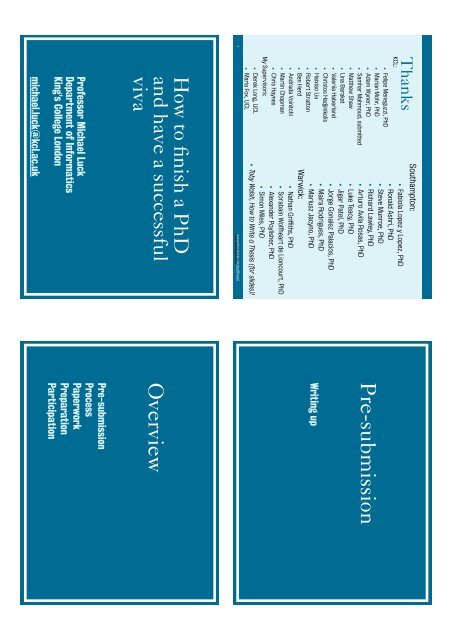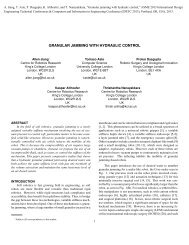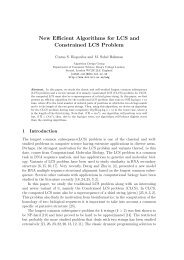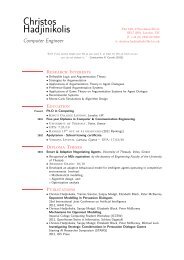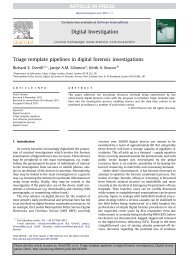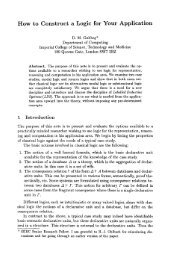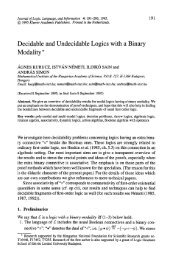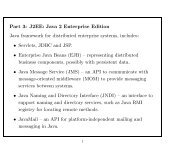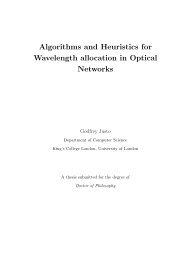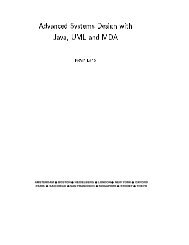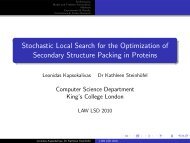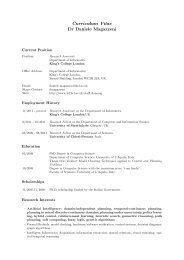How to finish a PhD and have successful viva
How to finish a PhD and have successful viva
How to finish a PhD and have successful viva
Create successful ePaper yourself
Turn your PDF publications into a flip-book with our unique Google optimized e-Paper software.
2<br />
Thanks<br />
KCL:<br />
• Felipe Meneguzzi, <strong>PhD</strong><br />
• Marian Mohr, <strong>PhD</strong><br />
• Adam Wyner, <strong>PhD</strong><br />
• Samhar Mahmoud, submitted<br />
• Matthew Shaw<br />
• Lina Barakat<br />
• Valeriia Haberl<strong>and</strong><br />
• Chris<strong>to</strong>s Hadjinikolis<br />
• Haixiao Liu<br />
• Robert Strat<strong>to</strong>n<br />
• Ben Herd<br />
• Andrada Voinitchi<br />
• Martin Chapman<br />
• Chris Haynes<br />
My Supervisors:<br />
• Derek Long, UCL<br />
• Maria Fox, UCL<br />
Southamp<strong>to</strong>n:<br />
• Fabiola Lopez y Lopez, <strong>PhD</strong><br />
• Ronald Ashri, <strong>PhD</strong><br />
• Steve Munroe, <strong>PhD</strong><br />
• Richard Lawley, <strong>PhD</strong><br />
• Arturo Avila Rosas, <strong>PhD</strong><br />
• Luke Teacy, <strong>PhD</strong><br />
• Jigar Patel, <strong>PhD</strong><br />
• Jorge Gonalez Palacios, <strong>PhD</strong><br />
• Maira Rodrigues, <strong>PhD</strong><br />
• Mariusz Jacyno, <strong>PhD</strong><br />
Warwick:<br />
• Nathan Gri!ths, <strong>PhD</strong><br />
• Sorabain Wolfheart de Lioncourt, <strong>PhD</strong><br />
• Alex<strong>and</strong>er Poylisher, <strong>PhD</strong><br />
• Simon Miles, <strong>PhD</strong><br />
• Toby Walsh, <strong>How</strong> <strong>to</strong> Write a Thesis (for slides)!<br />
www.dcs.kcl.ac.uk/sta!/mml<br />
<strong>How</strong> <strong>to</strong> <strong>finish</strong> a <strong>PhD</strong><br />
<strong>and</strong> <strong>have</strong> a <strong>successful</strong><br />
<strong>viva</strong><br />
Professor Michael Luck<br />
Department of Informatics<br />
King’s College London<br />
michael.luck@kcl.ac.uk<br />
Pre-submission<br />
Writing up<br />
Overview<br />
Pre-submission<br />
Process<br />
Paperwork<br />
Preparation<br />
Participation
6<br />
5<br />
www.dcs.kcl.ac.uk/sta!/mml<br />
Good News <strong>and</strong> Bad News<br />
• You only <strong>have</strong> <strong>to</strong> write ONE thesis<br />
• At the end, you can add “Dr” <strong>to</strong> your name<br />
• Good for upgrades on planes<br />
• Writing a thesis is hard, painful work<br />
• Some people never manage <strong>to</strong> write one<br />
• 99% perspiration, 1% inspiration<br />
• You’ve already done the fun part (the research)<br />
• It’s unlike any other document<br />
• Thesis writing is not a marketable skill<br />
www.inf.kcl.ac.uk<br />
8<br />
7<br />
What a thesis isn’t!<br />
• What I did in the lab over the last 3 years<br />
• I first read the background material<br />
• I then implemented an algorithm<br />
• I ran some experiments<br />
• A thesis is a logical reconstruction<br />
• Not a his<strong>to</strong>rical narrative<br />
• A brain dump of everything you’ve done<br />
• You get <strong>to</strong> leave out the dead-ends<br />
• But you <strong>have</strong> <strong>to</strong> fill in any obvious gaps!<br />
• A thesis is a logical reconstruction<br />
• With a single coherent message<br />
www.inf.kcl.ac.uk<br />
Why write a thesis?<br />
• Entry <strong>to</strong> academic career<br />
• In the process, you will learn<br />
• <strong>How</strong> <strong>to</strong> research<br />
• <strong>How</strong> <strong>to</strong> write<br />
• It will introduce your research <strong>to</strong> a wider audience<br />
• It will make you famous: Unlikely<br />
• It will radically change science: Unlikely<br />
• It will advance our knowledge: Just a little<br />
• Main benefit is in teaching you <strong>to</strong> do research<br />
www.inf.kcl.ac.uk
10<br />
9<br />
<strong>How</strong> <strong>to</strong> Start<br />
• Write a thesis statement<br />
• 1 sentence<br />
• 1 paragraph<br />
• 1 page<br />
• Everything you write should be directed at this<br />
• Thesis (noun).<br />
1. A proposition maintained by argument<br />
2. A dissertation advancing original research<br />
www.inf.kcl.ac.uk<br />
What is a thesis?<br />
• Demonstration of an underst<strong>and</strong>ing of the state<br />
of the art<br />
• Critical appreciation of existing work<br />
• A novel contribution<br />
• Evaluated systematically<br />
www.inf.kcl.ac.uk<br />
Thesis Statement<br />
BDI agent languages <strong>have</strong> been used mostly in the context of<br />
single agents based on a plan library of behaviours invoked<br />
reactively. Though they provide a theoretically sound basis for<br />
agent systems, they offer limited support for multiagent systems<br />
with dynamic plan libraries.<br />
In particular, when new plans not foreseeable at initial design time<br />
are required, an agent must be redesigned. In addition, agent<br />
languages provide at most a communication language with no<br />
other consideration of interaction.<br />
To address these limitations, we extend AgentSpeak(L) <strong>to</strong><br />
decouple goal achievement from plan execution, <strong>and</strong> generate<br />
new plans at design time. We also introduce a simple cooperation<br />
mechanism <strong>and</strong> a normative mechanism <strong>to</strong> provide a degree of<br />
societal control.<br />
12<br />
www.inf.kcl.ac.uk<br />
Thesis Statement<br />
• Agent programming languages are limited, by<br />
typically being restricted <strong>to</strong> single agent systems<br />
<strong>and</strong> predictable domains, <strong>and</strong> need <strong>to</strong> be<br />
modified <strong>to</strong> address dynamic, unpredictable <strong>and</strong><br />
multi-agent domains.<br />
11<br />
www.inf.kcl.ac.uk
14<br />
www.dcs.kcl.ac.uk/sta!/mml<br />
Thesis Statement<br />
One of the most widely studied agent models is based on the notions of<br />
beliefs, desires <strong>and</strong> intentions (or BDI) as mental attitudes that guide the<br />
selection of course of actions. <strong>How</strong>ever, BDI agent languages <strong>have</strong> been<br />
used mostly in the context of single agents based on a plan library of<br />
behaviours invoked reactively <strong>and</strong>, though they provide a theoretically sound<br />
basis for agent development, they offer limited support for multiagent systems<br />
with dynamic plan libraries.<br />
In particular, when new plans not foreseeable at initial design time are<br />
required, the agent must be redesigned. Moreover, when designing multiagent<br />
systems, agent languages provide at most a communication language with no<br />
other consideration of interaction.<br />
This thesis aims <strong>to</strong> address these limitations by introducing a new agent<br />
language <strong>and</strong> architecture that includes a mechanism for processing goals in<br />
a manner that decouples goal achievement from plan execution, as well as<br />
generating new plans <strong>to</strong> cope with unforeseen situations at design time. It<br />
bridges the gap between agent languages <strong>and</strong> multiagent systems by<br />
introducing a simple cooperation mechanism <strong>to</strong>gether with a norm processing<br />
mechanism aimed <strong>to</strong> providing some degree of societal control.<br />
13<br />
www.inf.kcl.ac.uk<br />
16<br />
15<br />
Table of Contents II<br />
• Introduction<br />
• Thesis statement<br />
• Background<br />
• Literature Review<br />
• Context, definitions, notation<br />
• 2-3 Content Chapters<br />
• Theoretical or algorithmic developments<br />
• Empirical results<br />
• Analysis<br />
• Related work<br />
• Conclusions<br />
• List contributions<br />
Table of Contents I<br />
• Introduction<br />
• Thesis statement<br />
• Background<br />
• Literature Review<br />
• Context, definitions, notation<br />
• Theoretical or algorithmic developments<br />
• Empirical results<br />
• Analysis<br />
• Related work<br />
• Conclusions<br />
• List contributions<br />
www.inf.kcl.ac.uk<br />
www.inf.kcl.ac.uk
18<br />
17<br />
Timetable<br />
• <strong>How</strong> long will it take?<br />
• Depends on many fac<strong>to</strong>rs<br />
• <strong>How</strong> much you’ve written as papers<br />
• …<br />
• Heavy-tailed distribution<br />
• Min = 2 months (very rare)<br />
• Max = infinity<br />
• Mean = infinity<br />
• Median = 6-9 months<br />
www.inf.kcl.ac.uk<br />
Table of Contents<br />
• Background & related work overlap<br />
• Need <strong>to</strong> discuss related work at start <strong>to</strong> set scene<br />
• Need <strong>to</strong> discuss related work at end <strong>to</strong> demonstrate<br />
your originality<br />
• Often one chapter per workshop or conference<br />
papers<br />
• But not cut <strong>and</strong> paste!<br />
www.inf.kcl.ac.uk<br />
20<br />
19<br />
www.dcs.kcl.ac.uk/sta!/mml<br />
www.dcs.kcl.ac.uk/sta!/mml
22<br />
21<br />
Timetable<br />
• “Your thesis is your baby”: P. Prosser<br />
• Give it 9 months<br />
• Write it up<br />
• Fill in gaps, experiments …<br />
• “You <strong>have</strong> <strong>to</strong> know when <strong>to</strong> let it go”<br />
• Put a fence around what you’ve done<br />
www.inf.kcl.ac.uk<br />
www.dcs.kcl.ac.uk/sta!/mml<br />
24<br />
23<br />
Writing chapters<br />
• Lay some good groundwork<br />
• LaTeX macros<br />
• Bib file<br />
• Indexing<br />
• …<br />
• You’ll discover holes in your research<br />
• Theorems you <strong>have</strong>n’t proved<br />
• Experiments you didn’t run<br />
• Di!erent problems or parameters<br />
• Mix writing with more research<br />
www.inf.kcl.ac.uk<br />
Writing chapters<br />
• Don’t start with the Introduction or Conclusion<br />
• Start where you feel happiest<br />
• Typically a middle chapter<br />
• Write outwards<br />
• Finally Conclusions <strong>and</strong> end with the Introduction<br />
• Write everything with your thesis message in mind<br />
• Get feedback before you write <strong>to</strong>o much<br />
• One person <strong>to</strong> read each chapter as it is written<br />
• Another person <strong>to</strong> read thesis in order<br />
www.inf.kcl.ac.uk
26<br />
25<br />
Common Mistakes<br />
• Informal text<br />
• Examiners will jump on imprecision<br />
• Opinions<br />
• “.. The main problem in CP is modelling ..”<br />
• A thesis is an argument!<br />
• “.. A major bottleneck preventing the uptake of CP is modelling<br />
[Freuder, AAAI-98]<br />
• Complex sentences full of long words: “Preponderate”<br />
• A thesis should be a simple, convincing argument!<br />
• Entertainment or humour<br />
• Joke footnote<br />
www.inf.kcl.ac.uk<br />
Rule of Three<br />
• Within each chapter, repeat yourself 3 times<br />
• Introduction: We will show ..<br />
• Body: Show ..<br />
• Conclusion: We <strong>have</strong> shown ..<br />
• Within thesis, repeat your contributions 3 times<br />
• Intro chapter<br />
• Main chapters<br />
• Conclusion chapter<br />
• But don’t bore reader<br />
• E.g. in introduction be brief, in conclusions be broader<br />
www.inf.kcl.ac.uk<br />
28<br />
27<br />
Common Problems<br />
• Writing <strong>to</strong>o much<br />
• There are rules about maximum length<br />
• But rarely rules about the minimum<br />
• Nash’s <strong>PhD</strong> thesis<br />
• 27 pages long<br />
• Won him a Nobel prize<br />
• At some point, your brain will surely become <strong>to</strong>ast<br />
• Take a break<br />
• Eat properly, exercise, sleep …<br />
www.inf.kcl.ac.uk<br />
Common Problems<br />
• It’s never possible <strong>to</strong> cover all issues<br />
• So you will never <strong>finish</strong>?<br />
• It’s sometimes enough <strong>to</strong> identify the issues<br />
• Examiners greatly appreciate you identifying<br />
limitations<br />
• Examiners greatly appreciate finding a few mistakes<br />
• Ideas become obvious <strong>to</strong> you<br />
• You s<strong>to</strong>p writing <strong>to</strong> a su"cient level of detail<br />
• Especially hurts the opening chapters as they are<br />
often written last<br />
www.inf.kcl.ac.uk
30<br />
29<br />
Other Issues<br />
• Presentation of results<br />
• Have the hypotheses in fact been tested?<br />
• Are the results shown <strong>to</strong> support the hypothesis?<br />
• Is the data properly analysed?<br />
• Are the results presented clearly?<br />
• Are patterns identified <strong>and</strong> summarised?<br />
• Discussion <strong>and</strong> Conclusions<br />
• Are the limits of the research identified?<br />
• Are the main points <strong>to</strong> emerge identified?<br />
• Are links made <strong>to</strong> the literature?<br />
• Is there theoretical development?<br />
• Are the speculations well grounded?<br />
www.inf.kcl.ac.uk<br />
Other Issues<br />
• Review of literature<br />
• Is the literature relevant?<br />
• Is the review critical or just descriptive?<br />
• Is it comprehensive?<br />
• Does it link <strong>to</strong> the methodology in the thesis?<br />
• Does it summarise the essential aspects?<br />
• Methodology<br />
• Is there a clear hypothesis?<br />
• Are precautions taken against bias?<br />
• Are the limitations identified?<br />
• Is the data collected appropriately?<br />
• Is the methodology justified?<br />
www.inf.kcl.ac.uk<br />
32<br />
31<br />
Your supervisor<br />
• Your supervisor is on your side<br />
• Your success is their success<br />
• Intellectual support<br />
• Quality assurance<br />
• What st<strong>and</strong>ard a thesis should reach<br />
• Indication of when <strong>to</strong> s<strong>to</strong>p<br />
• Do not expect:<br />
• Smiles<br />
• If draft chapters contain simple spelling mistakes <strong>and</strong> typos<br />
• Mind-reading skills<br />
www.inf.kcl.ac.uk<br />
www.dcs.kcl.ac.uk/sta!/mml
33<br />
Process <strong>and</strong><br />
paperwork<br />
Long <strong>and</strong> bureaucratic,<br />
but VERY IMPORTANT<br />
Pay attention <strong>to</strong> timing!!!<br />
www.dcs.kcl.ac.uk/sta!/mml<br />
36<br />
35<br />
Stage 1: 6 months before<br />
• Student <strong>and</strong> supervisor complete<br />
• Examination entry form (RD1)<br />
• Reproduction of thesis form (RD4)<br />
• Description of Thesis form (RD5)<br />
• Supervisor completes<br />
• Nomination of examiner form (RD2)<br />
• refer <strong>to</strong> Subject Area Boards<br />
• countersigned by HoD<br />
• NOW: Student <strong>and</strong> supervisor complete new RD1<br />
www.inf.kcl.ac.uk<br />
FORMS UPDATED<br />
Stage 2<br />
• College Examinations O!ce<br />
• completes the RDS section of the student record<br />
system<br />
• sends Eligibility <strong>and</strong> Selection form (RD3) <strong>to</strong> the<br />
examiners nominated<br />
• follows up any missing or incomplete information<br />
www.inf.kcl.ac.uk
38<br />
37<br />
Stage 4<br />
• Decision taken by College Research Degrees<br />
Board of Examiners <strong>to</strong><br />
• appoint examiners or<br />
• require supervisor <strong>to</strong> nominate alternative examiners<br />
• College Examinations O!ce<br />
• informs supervisor when examiners are approved<br />
• sends out copies of thesis <strong>and</strong> documentation <strong>to</strong><br />
examiners.<br />
www.inf.kcl.ac.uk<br />
Stage 3<br />
• College Examinations O!ce circulates details of<br />
the examiners nominated <strong>to</strong> the relevant Subject<br />
Area Board<br />
• This recommends <strong>to</strong> the College within 3-4<br />
weeks of receipt whether the examiners should<br />
be appointed.<br />
www.inf.kcl.ac.uk<br />
40<br />
39<br />
Stage 6<br />
• Once thesis has been submitted, oral<br />
examination is arranged by supervisor<br />
• not less than one month <strong>and</strong> not more than three<br />
months after receipt of thesis<br />
• Supervisor notifies Examinations O!ce <strong>and</strong><br />
School O!ce of date of <strong>viva</strong><br />
• Examiners<br />
• prepare individual preliminary reports prior <strong>to</strong> oral<br />
examination<br />
• send them <strong>to</strong> Examinations O"ce before <strong>viva</strong><br />
www.inf.kcl.ac.uk<br />
Stage 5<br />
• Student submits <strong>to</strong> College Examinations O!ce<br />
• Thesis<br />
• Declaration of words form (RD7)<br />
• Abstract (RD8)<br />
• This may be concurrent with Stages 3 or 4<br />
• Neither student nor supervisor may send a<br />
thesis directly <strong>to</strong> examiners<br />
www.inf.kcl.ac.uk
42<br />
41<br />
Stage 8<br />
• Outcome of <strong>viva</strong> ratified by Research Degrees<br />
Board of Examiners on receipt of the joint<br />
report, <strong>and</strong> Pass list approved<br />
• Examiners’ Report is sent <strong>to</strong> Principal <strong>and</strong><br />
subsequently <strong>to</strong> School by Quality Assurance<br />
Section<br />
• Award dates are recorded by College<br />
Examinations O!ce<br />
www.inf.kcl.ac.uk<br />
Stage 7<br />
• Examiners submit joint report <strong>to</strong> the<br />
Examinations O!ce<br />
• within two weeks of <strong>viva</strong><br />
• Where minor changes are required, examiners<br />
also submit list of the changes required <strong>to</strong><br />
Examinations O!ce <strong>and</strong> c<strong>and</strong>idate<br />
• immediately after the examination<br />
• A maximum of three months are permitted for such<br />
changes<br />
www.inf.kcl.ac.uk<br />
43<br />
Preparation<br />
Pre-Viva Preparation<br />
Stage 9<br />
• For resubmissions, examiners must prepare full<br />
list of issues that student should address<br />
• Examinations O!ce provides students with<br />
examiners’ report or reports.<br />
• Maximum time permitted <strong>to</strong> re-present the<br />
thesis is 18 months<br />
www.inf.kcl.ac.uk
46<br />
45<br />
Check out your examiners<br />
• Ensure you are familiar with the research work<br />
of your examiners<br />
• Check out their broad areas of research<br />
• especially what they are doing now!<br />
• This will give you a feel for their views on<br />
research <strong>and</strong> the sorts of things they are likely <strong>to</strong><br />
concentrate on<br />
www.inf.kcl.ac.uk<br />
Read the thesis<br />
• Re-read your thesis several times in the week<br />
preceding the <strong>viva</strong><br />
• Probably a gap of at least a month between<br />
submission <strong>and</strong> the <strong>viva</strong><br />
• Even though you think you know what you wrote, you<br />
will <strong>have</strong> forgotten some things<br />
• Examiners should not get the impression that you<br />
don’t know where things are in your thesis, especially<br />
if you want <strong>to</strong> argue with them by referring <strong>to</strong><br />
something you <strong>have</strong> written<br />
www.inf.kcl.ac.uk<br />
48<br />
47<br />
Questions<br />
• It is impossible <strong>to</strong> predict the exact nature of the<br />
questions that will be asked in the <strong>viva</strong> itself,<br />
but ...<br />
• There are several common types of question<br />
that are likely <strong>to</strong> arise<br />
• Having thought about these in advance you will<br />
be able <strong>to</strong> produce better answers<br />
• It’s useful <strong>to</strong> prepare some notes (<strong>to</strong> which you<br />
can refer) for these questions.<br />
www.inf.kcl.ac.uk<br />
Check out your supervisors<br />
• Ensure you are familiar with the research of your<br />
supervisor!<br />
• Examiners are often research colleagues of your<br />
supervisor<br />
• They will know what research your supervisor is<br />
undertaking at the moment<br />
• may be interested in how your <strong>PhD</strong> fits in<strong>to</strong> this<br />
overall picture<br />
www.inf.kcl.ac.uk
50<br />
49<br />
Questions: novelty<br />
• What is novel about your research?<br />
• This is the key question for a <strong>PhD</strong><br />
• Make sure you are clearly able <strong>to</strong> articulate the key<br />
ways in which your thesis advances the state of the<br />
art.<br />
• It’s the contributions, Stupid!<br />
www.inf.kcl.ac.uk<br />
Questions: your research<br />
• Summarise the research work you <strong>have</strong><br />
undertaken.<br />
• This is often used as a starting question <strong>to</strong> get you<br />
talking<br />
• You should describe (taking about five minutes) what<br />
research you <strong>have</strong> undertaken.<br />
www.inf.kcl.ac.uk<br />
52<br />
51<br />
Questions: collaboration<br />
• If you <strong>have</strong> performed the research in a<br />
collaborative project or in partnership with<br />
somebody else other than your supervisor, you<br />
may be asked about the relative contributions of<br />
the participants.<br />
• In particular, the examiner will want <strong>to</strong> underst<strong>and</strong><br />
precisely what you did. Answer honestly!<br />
www.inf.kcl.ac.uk<br />
Questions: shortcomings<br />
• What are the main shortcomings of your<br />
research?<br />
• It is acceptable <strong>to</strong> <strong>have</strong> shortcomings, although this<br />
list should be shorter than your contributions!<br />
• <strong>How</strong> can these shortcomings be addressed?<br />
• If you were starting again, what would you do<br />
di"erently?<br />
www.inf.kcl.ac.uk
54<br />
53<br />
More common questions<br />
• Why is your research <strong>to</strong>pic an important one?<br />
• What impact do your results <strong>have</strong> for the wider<br />
research community?<br />
• If somebody was <strong>to</strong> start their Ph.D. by building<br />
upon yours, what would be the key pieces of<br />
advice that you would give them?<br />
www.inf.kcl.ac.uk<br />
Questions: publication<br />
• If you <strong>have</strong> not published much from your thesis<br />
<strong>to</strong> date, why not?<br />
• Which of the chapters you <strong>have</strong> written would be<br />
appropriate for publication, <strong>and</strong> in what sort of<br />
forum?<br />
www.inf.kcl.ac.uk<br />
What NOT <strong>to</strong> say at your <strong>viva</strong><br />
1. "Ladies <strong>and</strong> Gentlemen, please rise for the singing of our National<br />
Anthem..."<br />
2. Charge 25 cents a cup for co"ee.<br />
3. Stage your own death/suicide.<br />
4. "I'd like <strong>to</strong> thank the Academy..."<br />
5. Answer every question with a question.<br />
6. "Laugh, will you? Well, they laughed at Galileo, they laughed at Einstein..."<br />
7. "I could answer that, but then I'd <strong>have</strong> <strong>to</strong> kill you."<br />
8. Show slides of your last vacation.<br />
9. Try <strong>to</strong> use normal printed paper on the overhead projec<strong>to</strong>r.<br />
10. "Please phrase your question in the form of an answer..."<br />
56<br />
www.inf.kcl.ac.uk<br />
Participation<br />
The Viva Itself
58<br />
57<br />
www.dcs.kcl.ac.uk/sta!/mml<br />
Basics<br />
• Know the date, time <strong>and</strong> location of the <strong>viva</strong><br />
• Be alert<br />
• no wine, women/men or song the night before!<br />
• Aim <strong>to</strong> arrive at least 20 minutes before the start<br />
• Dress reasonably smart<br />
• it is an important day<br />
• Bring your copy of the thesis<br />
• the same as the one you sent the examiner (they will<br />
say things like on page 79, para 3 you said X).<br />
www.inf.kcl.ac.uk<br />
60<br />
59<br />
Examiners: context<br />
• Examiners will want <strong>to</strong> be clear that you<br />
underst<strong>and</strong> the wider implications <strong>and</strong> context of<br />
your research<br />
• They will ask about related work that is in your thesis<br />
• They may ask about work in the more general<br />
community that you <strong>have</strong> not referred <strong>to</strong><br />
• This is di"cult <strong>to</strong> prepare for, but you should at least<br />
<strong>have</strong> some vague knowledge of the papers presented<br />
at recent important conferences in your field<br />
www.inf.kcl.ac.uk<br />
Examiners<br />
• The role of the examiners is <strong>to</strong> attack the thesis<br />
• They will ask you di!cult questions, <strong>and</strong> they will<br />
aim <strong>to</strong> tease out the limitations of your work<br />
• They will concentrate on the novelty aspects that you<br />
claim<br />
• They will want <strong>to</strong> be convinced that you can<br />
substantiate under questioning the claims that you<br />
make<br />
• They may also ask you <strong>to</strong> go in detail through<br />
particular parts of the thesis (for example, a<br />
particular proof) <strong>to</strong> ensure that you can reproduce it<br />
www.inf.kcl.ac.uk
62<br />
61<br />
Responses<br />
• Always be courteous <strong>to</strong> your examiners<br />
• They are not attacking you personally, but the work:<br />
this is their role<br />
• If you do not underst<strong>and</strong> a question, ask them <strong>to</strong><br />
clarify what they mean<br />
• Better than starting o! on the wrong foot<br />
• Your thesis will <strong>have</strong> shortcomings <strong>and</strong><br />
limitations<br />
• Don’t be afraid <strong>to</strong> admit it<br />
www.inf.kcl.ac.uk<br />
Examiners: stupidity<br />
• Sometimes, examiners like <strong>to</strong> ask apparently<br />
stupid questions <strong>to</strong> ensure that you can discuss<br />
issues sensibly <strong>and</strong> coherently<br />
• Sometimes they simply try <strong>to</strong> see if you can<br />
identify that what they’re arguing is not sensible<br />
• Some examiners deliberately say that they<br />
couldn’t see reference <strong>to</strong> X in your thesis (even<br />
when they <strong>have</strong> seen it) <strong>to</strong> work out if you did<br />
actually write the thesis!<br />
www.inf.kcl.ac.uk<br />
64<br />
63<br />
Who’s the expert?<br />
• Remember that of all the people sitting in the<br />
room, you are the expert in the particular <strong>to</strong>pic<br />
of your <strong>PhD</strong><br />
• You know it better than anybody else<br />
• Don’t be afraid <strong>to</strong> argue your case based on<br />
what you <strong>have</strong> done<br />
www.inf.kcl.ac.uk<br />
Responses<br />
• If an examiner points out something not<br />
addressed, then admit it <strong>and</strong> explain why you<br />
<strong>have</strong> chosen not <strong>to</strong> deal with this issue<br />
• If an examiner asks about some related work<br />
that you don’t know about, say so<br />
• Some people say that you should concede <strong>to</strong> the<br />
examiners at least once in the <strong>viva</strong>!<br />
• If you genuinely do not know the answer <strong>to</strong> a<br />
question then say so.<br />
www.inf.kcl.ac.uk
66<br />
65<br />
The Outcome<br />
• Pass (with thesis as is)<br />
• Minor revisions (more common)<br />
• To be completed within three months of the <strong>viva</strong>, <strong>and</strong><br />
<strong>to</strong> be checked by the examiners<br />
• Examiners will specify the corrections<br />
• Make sure that you follow instructions carefully<br />
• Do so in a timely fashion<br />
• Make it easy for the internal examiner <strong>to</strong> certify that<br />
everything has been done <strong>to</strong> their satisfaction<br />
www.inf.kcl.ac.uk<br />
Role of the supervisor<br />
• In general, supervisors <strong>have</strong> no role in the <strong>viva</strong><br />
• They cannot interfere in the process<br />
• Do not look <strong>to</strong> them for help or advice<br />
• Talk with your supervisor in advance<br />
• Many will try <strong>to</strong> assist by taking notes for you so that<br />
you can concentrate on the questions <strong>and</strong> discussion<br />
with the examiners.<br />
www.inf.kcl.ac.uk<br />
67<br />
Good Luck!<br />
The Outcome<br />
• Major revisions <strong>to</strong> the thesis, usually taking<br />
longer than three months<br />
• May require some extra work <strong>to</strong> be done, possibly<br />
some further experimentation or some other<br />
substantial activity<br />
• Typically, this will require an additional <strong>viva</strong>.<br />
• In some cases, although rare, examiners may<br />
choose <strong>to</strong> award an MPhil or <strong>to</strong> fail the c<strong>and</strong>idate<br />
outright.<br />
• Thankfully, this is a very rare occurrence.<br />
www.inf.kcl.ac.uk
A rabbit is sitting outside a cave <strong>and</strong> is very intent upon writing. A fox<br />
comes along <strong>and</strong> asks the rabbit what he's doing. "I'm writing a thesis on<br />
how rabbits eat foxes." says the rabbit. "No way," says the fox. So the<br />
rabbit takes the fox in<strong>to</strong> the cave <strong>and</strong> a few minutes later out comes the<br />
rabbit looking very smug <strong>and</strong> holding a fox skull. Some time later, a wolf<br />
comes along <strong>and</strong> asks the rabbit what he's doing. "I'm writing a thesis on<br />
how rabbits eat foxes <strong>and</strong> wolves." says the rabbit. "No way," says the<br />
wolf. So the rabbit takes the wolf in<strong>to</strong> the cave <strong>and</strong> a few minutes later out<br />
comes the rabbit looking doubly smug <strong>and</strong> holding a wolf skull. Some time<br />
later, a bear comes along <strong>and</strong> asks the rabbit what he's doing. "I'm just<br />
<strong>finish</strong>ing my thesis on how rabbits eat foxes, wolves, <strong>and</strong> bears." says the<br />
rabbit. The bear roars his disbelief <strong>and</strong> follows the rabbit in<strong>to</strong> the cave.<br />
And, as you might expect, back in the cave is a huge lion who promptly<br />
gobbles up the bear, just as he did the wolf <strong>and</strong> fox. The rabbit bounds<br />
happily out of the cave holding his <strong>PhD</strong>.<br />
Moral: It's not the content of your thesis that counts, but your advisor.<br />
69<br />
www.inf.kcl.ac.uk


